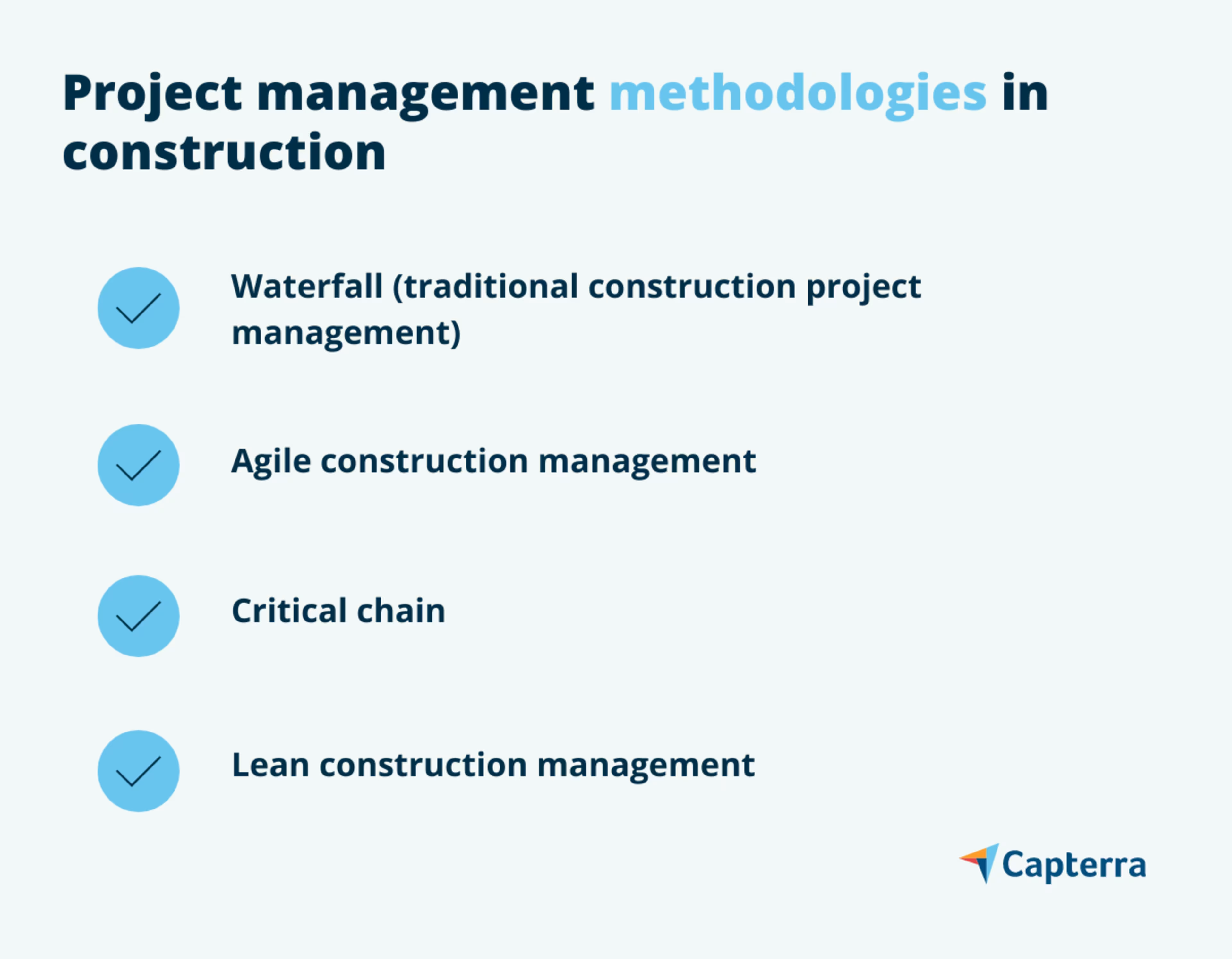These project management methodologies keep construction jobs timely and profitable.
Project management is a key component of all business strategies. In the construction field, it's a necessity. Project management in construction helps identify and mitigate potential risks, saves time and money, and ensures efficient project delivery. A construction firm owner or manager faces only one dilemma: Which construction project management methodology should our business employ?
If you have wondered whether the traditional "waterfall" approach is right for your construction team or if another construction methodology is a better fit for your industry, this is the guide you have been looking for.
Here is the ultimate review of project management in construction—the different types, how they differ, and how to find the best one for your team.
What is construction project management?
Construction project management is the planning, control, and coordination of every aspect of a building project from beginning to end. It requires coordinating people, deadlines, budgets, and stakeholders to deliver a project on time, on budget, and within specifications.
There are multiple approaches to construction project management. Each is suited to specific types of projects or different construction businesses. Finding the project management methodology that fits your organization or project helps ensure smooth projects that are completed on time.
What are the different project management methodologies used in construction?
Waterfall and agile are two of the most popular approaches to construction methodology. However, there are two other methodologies commonly employed in construction. Here’s a look at all four standard construction project management methodologies:

Waterfall, or traditional construction project management
Waterfall project management is the most common form of construction project management technique. Alternatively known as, “traditional project management”, this technique involves clear milestones between each task.
In waterfall, there are set due dates, project deliverables, and client expectations organized on a clear timeline. Each phase of the project moves downhill toward completion, much like an actual waterfall.
Agile construction management
Agile construction management takes the flexibility of agile software development and applies it to construction. Speed and adaptability are the primary goals of this approach. If a particular iteration, or project step, is slowing down a project, it is revised in real time.
Another hallmark of agile adjusting as you go, rather than sticking with a linear, monolithic approach to project management. Agile projects are broken into smaller, more manageable parts.
Critical chain
In the world of project management, the "critical chain" is defined as the longest chain considering task and resource dependencies. In the critical chain project methodology, if a task dependency exists, a successor task can only start upon completion of the predecessor task.
In construction industry practice, the critical chain methodology creates a more disciplined mindset in planning, scheduling, and executing projects.
Lean construction management
Lean construction management is descended from lean supply chain management techniques. This approach aims to save money through a reduction of waste and an increase in efficiency.
Lean is the strategy known for delivering fast and cost-efficient projects. The lean methodology emphasizes arranging the supply chain so there are no unnecessary breaks when working on production.
Bonus: Three more approaches to construction project management
Waterfall, agile, critical chain, and lean may be the four most popular construction project methodologies, but there are other approaches. While less widely used, they might be a perfect fit for one of your projects.
1. Construction work breakdown structure (WBS)
The work breakdown structure (WBS) approach to project management is hierarchical. Each descending level represents a more detailed definition of the project work.
The WBS method presents just the deliverables within the boundaries of the project scope. It does not include activities. A good project manager should leave listing activities to the Project Schedule. Bottom line: keep it simple!
2. Construction risk management
In the construction industry, risks come in a variety of flavors. For instance, there are health and safety risks, risks to the environment, operational risks, regulatory risks, and so on.
A risk management approach to construction projects prioritizes health, safety, and environmental concerns. The project is organized around deploying, tracking, and reporting on risks at worksites, providing a different perspective than standard project management methodologies.
3. Construction cost estimating
The foundation of any well-run construction project is a reasonable estimate. Construction cost estimating is so essential that it can be seen as a project methodology in and of itself.
Viewing estimating as a project can help overcome some standard construction challenges. For example, a common issue is that some items may use square foot pricing data from past projects; for others, you may do a detailed takeoff and then get sticker pricing from a trusted supplier. A cost-estimating project methodology addresses issues like this by keeping spec sheets, estimates, and bid requests in sync.
What are the core principles of each major construction project management methodology?
Each construction project management methodology brings its own set of core principles to the table:
Waterfall: This traditional methodology is linear and sequential; each project step must be completed first. The fundamental principles are thorough planning early, strict adherence to schedules and budgets, and minimal change after the project is underway.
Agile: The agile methodology is based on flexibility, collaboration, and iterative development. The fundamental tenets of agile are: decomposing the project into manageable tasks or iterations, regular communication and feedback loops with stakeholders, being responsive to changing requirements, and improving throughout the project lifecycle.
Critical chain: This methodology involves defining and controlling the project's critical path to minimize the risk and maximize the utilization of resources. Critical chain's core principles are prioritizing tasks according to their impact on the project timeline, controlling resource dependencies, and protecting the project from uncertainties and disruptions.
Lean construction management: Lean principles emphasize maximizing value and reducing waste throughout the construction process. This includes eliminating non-value-adding activities, optimizing workflow and resource utilization, fostering collaboration between project teams, and continuously striving for improvement in efficiency and productivity.
How do these methodologies differ in terms of planning, scheduling, risk management, and communication?
To determine the best methodology for your construction business, start by reviewing how they differ in core principles like planning and scheduling.
In the waterfall methodology, planning is done upfront. All requirements and milestones are established before the project even begins. The scheduling component is rigid, with each phase occurring in sequence. Risk management is about early detection and risk mitigation through planning. Communication tends to be formal and structured, with predetermined channels and documentation.
Meanwhile, agile planning is iterative; requirements and tasks are modified throughout the lifecycle of the project as feedback is received. Scheduling is a series of short iterations or sprints that can be flexible to change priorities. Risk management is incorporated into the iterative process with periodic review and adjustment. Its communication is informal and frequent, emphasizing collaboration and interaction with people in person.
The critical chain methodology planning focuses on determining the critical path of the project for efficient utilization of resources. Scheduling considers resource dependencies as a means of reducing delays. The risk management aspect focuses on mitigating uncertainties that could affect the critical path. There is an emphasis on coordination of resource allocation and resolution of problems that may affect the critical path.
Lean construction management planning focuses on value creation and waste reduction throughout the project's lifecycle. Scheduling helps reduce waste and inefficiencies by optimizing workflow and resource usage. Risk management involves identifying and eliminating waste sources that may negatively impact project performance. Communication focuses on collaboration and openness for continuous improvement and value delivery.
What are the strengths and weaknesses of each methodology in the context of construction projects?
Of course, no single methodology is perfect. Each has its strengths and weaknesses.
Waterfall's strengths are that it structures deliverables and milestones with clear deliverables. Before deciding on a methodology for your construction business or a specific project, consider these pros and cons.
Methodology | Strengths | Weaknesses |
Waterfall | A linear and sequential approach. Clearly defined stages that flow sequentially from start to finish. | Limited flexibility once the project is underway. Can cause delays and cost overruns when requirements change. |
Agile | A flexible and responsive methodology that adapts quickly to project changes. Works in iterative cycles. | Due to its iterative nature, it may not work well for projects with fixed budgets or tight deadlines. |
Critical chain | Step-by-step technique for process planning that identifies critical and non-critical project tasks to prevent conflicts and delays. | Requires accurate resource availability and dependency information, which may be difficult to discern. |
Lean methodology | Prioritizes value delivery and waste reduction for efficient, cost-effective projects. | May require significant cultural and organizational change for effective implementation. |
How can project managers determine the most suitable methodology for their specific needs?
Considering the above, how can you pick the project management methodology best suited for your construction business? Consider these factors:
Project characteristics
Analyze the project scope, complexity, and requirements. A waterfall approach is better for projects with defined and stable requirements while agile methodology works better for projects with dynamic requirements.
Limitations and objectives
Consider the project's budget, schedule, and regulatory constraints. The critical chain methodology may be appropriate for projects with tight deadlines. Lean construction management may help maximize resource use and reduce waste.
Stakeholder preference
Identify the needs and priorities of project stakeholders: clients, contractors, and team members. Work with stakeholders to choose a methodology that meets their needs and preferences for communication.
Organizational culture
Assess your organization's culture and experience with project management techniques. Select a methodology that you can implement within those confines.
What are the best practices for implementing and adapting different methodologies in construction?
Once you have selected the best methodology for your company (or a specific project), the next step is forming an implementation plan. To follow best practices, ensure that all team members have training on the chosen methodology. This ensures an understanding of and commitment to the new approach.
Starting with pilot projects validates the methodology in a controlled environment. It allows for iterations before full-scale deployment. Do not be afraid to adapt the methodology to suit your organization. However you go about it, clear communication is necessary to facilitate collaboration and transparency among your team and the various stakeholders.
Fostering a culture of continuous improvement is helpful with any implementation. Conduct regular meetings with project reviews based on feedback and what you have learned. The right project management software also helps facilitate a smooth implementation.
Project management for construction: An essential tool
While laypersons may think construction is all about physical strength and being handy with tools. It is actually built around highly structured projects. As with any other industry based around projects, the right project methodology keeps you on track, saves time and money, and helps foster success. It is an essential skill everyone in the construction trade should know about.
As the owner or manager of a construction business, it is normal to try one approach to project management before settling on the proper methodology for your stakeholders. Now that you have the knowledge in this guide to project management for construction projects, you can select the best approach for your company or an individual project.
To learn more, visit these Capterra resources about the construction industry:

